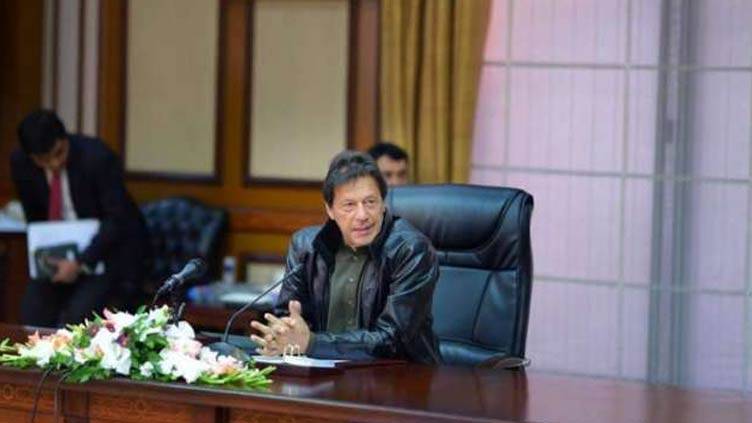Prime Minister Imran Khan on Monday chaired a meeting Apex Committee on National Action Plan in Islamabad.
The meeting was attended by Federal Ministers including Fawad Ahmed, Sheikh Rashid Ahmed, Asad Umer, National Security Advisor Dr. Moeed Yousaf, Army Chief General Qamar Javed Bajwa, Chief Ministers Sardar Usman Buzdar (Punjab), Murad Ali Shah (Sindh), Mehmood Khan (Khyber Pakhtunkhwa, Abdul Quddus Bazenjo (Balochistan), Khalid Khursheed (Gilgit Baltistan), Chief Secretaries, Inspector Generals of Police and senior civil and military officers.
During the meeting, he emphasized that multi-pronged approach, full spectrum and vigorous implementation of NAP is required to thwart threat of terrorism.
Imran Khan said that the government had zero tolerance for terrorists and swift persecution was required to set an example out of terrorist elements. He stressed upon taking proactive measures to tackle such incidents in future.
The prime minister stated that nefarious designs to destabilize the country would never succeed as the entire nation was united to defeat the menace of terrorism.
He stated that the public realized that elements were trying to create disharmony on the basis of sectarianism and hate speech, but the state will never allow such designs to succeed.
The committee stressed upon the need to strengthen the role of National Counter Terrorism Authority (NACTA) to coordinate measures essential for countering terrorism and capacity building of Counter Terrorism Departments. It was also highlighted that provinces need to allocate more resources for conducting effective investigations by adopting scientific techniques and setting up modern forensic labs. The need to accord conclusive end to terrorism cases in courts of law was emphasized.
Secretary, Interior Division presented a detailed briefing on the implementation status of NAP including measures taken to choke terror financing, countering violent extremism, investigation and prosecution of terrorism cases, intolerance towards militancy, capacity building of law enforcement agencies, regulation and registration of seminaries, merger of formerly FATA areas, reforms in criminal justice system, eliminating sectarian terrorism, curbing smuggling, narco-traffic and human trafficking, reconciliation process in Balochistan and issues related to refugees.
The meeting was briefed that satisfactory implementation had been achieved on majority action points, however, support from provincial governments was required for inter-provincial issues.
The meeting was attended by Federal Ministers including Fawad Ahmed, Sheikh Rashid Ahmed, Asad Umer, National Security Advisor Dr. Moeed Yousaf, Army Chief General Qamar Javed Bajwa, Chief Ministers Sardar Usman Buzdar (Punjab), Murad Ali Shah (Sindh), Mehmood Khan (Khyber Pakhtunkhwa, Abdul Quddus Bazenjo (Balochistan), Khalid Khursheed (Gilgit Baltistan), Chief Secretaries, Inspector Generals of Police and senior civil and military officers.
During the meeting, he emphasized that multi-pronged approach, full spectrum and vigorous implementation of NAP is required to thwart threat of terrorism.
Imran Khan said that the government had zero tolerance for terrorists and swift persecution was required to set an example out of terrorist elements. He stressed upon taking proactive measures to tackle such incidents in future.
The prime minister stated that nefarious designs to destabilize the country would never succeed as the entire nation was united to defeat the menace of terrorism.
He stated that the public realized that elements were trying to create disharmony on the basis of sectarianism and hate speech, but the state will never allow such designs to succeed.
The committee stressed upon the need to strengthen the role of National Counter Terrorism Authority (NACTA) to coordinate measures essential for countering terrorism and capacity building of Counter Terrorism Departments. It was also highlighted that provinces need to allocate more resources for conducting effective investigations by adopting scientific techniques and setting up modern forensic labs. The need to accord conclusive end to terrorism cases in courts of law was emphasized.
Secretary, Interior Division presented a detailed briefing on the implementation status of NAP including measures taken to choke terror financing, countering violent extremism, investigation and prosecution of terrorism cases, intolerance towards militancy, capacity building of law enforcement agencies, regulation and registration of seminaries, merger of formerly FATA areas, reforms in criminal justice system, eliminating sectarian terrorism, curbing smuggling, narco-traffic and human trafficking, reconciliation process in Balochistan and issues related to refugees.
The meeting was briefed that satisfactory implementation had been achieved on majority action points, however, support from provincial governments was required for inter-provincial issues.






